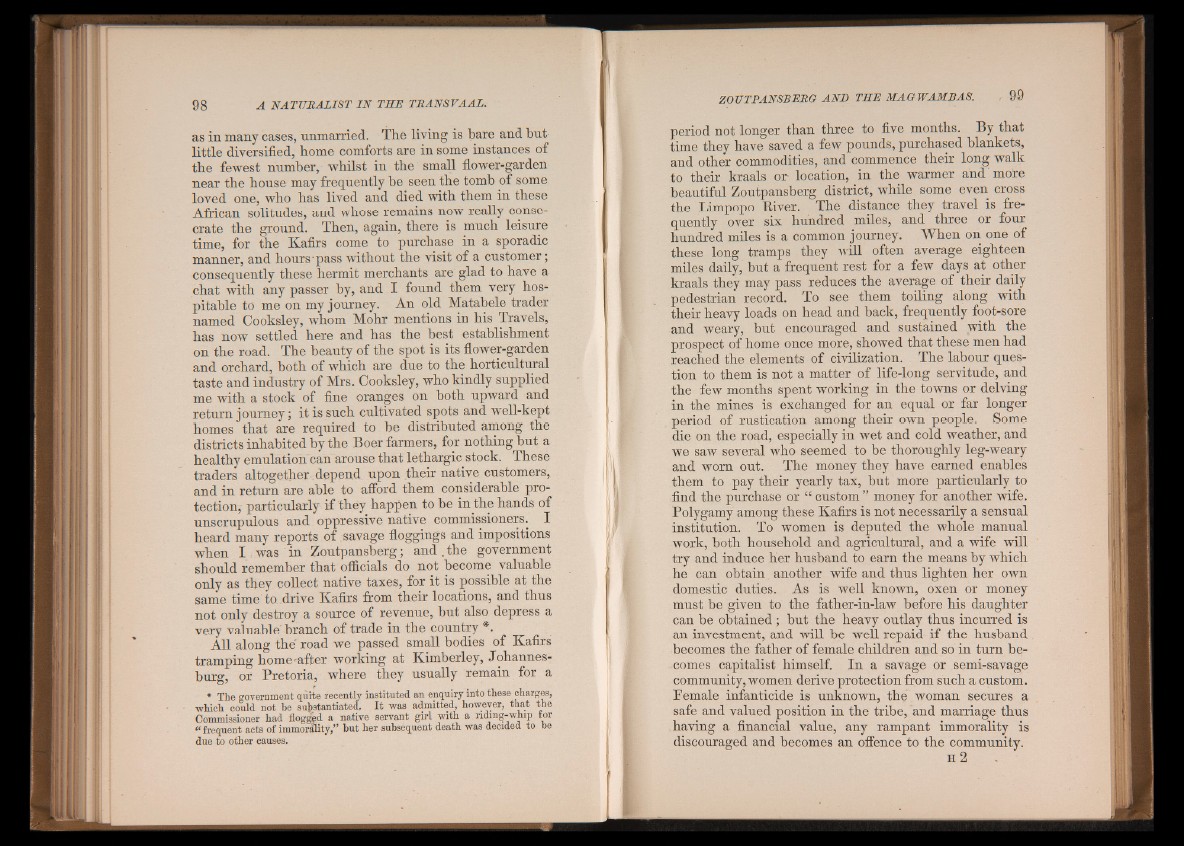
as in many cases, unmarried. The living is bare and but-
little diversified, home comforts are in some instances of
the fewest number, whilst in the small flower-garden
near the house may frequently be seen the tomb of some
loved one, who has lived and died with them in these
African solitudes, and whose remains now really consecrate
the ground. Then, again, there is much leisure
time, for the Kafirs come to purchase in a sporadic
manner, and hours pass without the visit of a customer ;
consequently these hermit merchants are glad to have a
chat with any passer by, and I found them very hospitable
to me on my journey. An old Matabele trader
named Cooksley, whom Mohr mentions in his Travels,
has now settled here and has the best establishment
on the road. The beauty of the spot is its flower-garden
and orchard, both of which are due to the horticultural
taste and industry of Mrs. Cooksley, who kindly supplied
me with a stock of fine oranges on both upward and
return journey ; it is such cultivated spots and well-kept
homes that are required to be distributed among the
districts inhabited by the Boer farmers, for nothing but a
healthy emulation can arouse that lethargic stock. These
traders altogether depend upon their native customers,
and in return are able to afford them considerable protection,
particularly if they happen to be in the hands of
unscrupulous and oppressive native commissioners. I
heard many reports of savage floggings and impositions
when I . was in Zoutpansberg ; and . the government
should remember that officials do not become valuable
only as they collect native taxes, for it is possible at the
same time to drive Kafirs from their locations, and thus
not only destroy a source of revenue, but also depress a
very valuable branch of trade in the country *.
All along the' road we passed small bodies of Kafirs
tramping home-after working at Kimberley, Johannesburg,
or Pretoria, where they usually remain for a
* The government quit© recently instituted an enquiry into these charges,
which could not he substantiated, I t was admitted, however, that the
Commissioner had flogged a native servant girl with a ndmg-wlup for
“ frequent acts of immorality,” but her subséquent death was decided to be
due to other causes.
period not longer than three to five months. By that
time they have saved a few pounds, purchased blankets,
and other commodities, and commence their long walk
to their kraals or- location, in the warmer and more
beautiful Zoutpansberg district, while some even cross
the Limpopo River. The distance they travel is frequently
over six hundred miles, and three or four
hundred miles is a common journey. When on one of
these long tramps they will often average eighteen
miles daily, but a frequent rest for a few days at other
kraals they may pass reduces the average of their daily
pedestrian record. To see them toiling along with
their heavy loads on head and back, frequently foot-sore
and weary, but encouraged and sustained with the
prospect of home once more, showed that these men had
reached the elements of civilization. The labour question
to them is not a matter of life-long servitude, and
the few months spent working in the towns or delving
in the mines is exchanged for an equal or far longer
period of rustication among their own people. Some
die on the road, especially in wet and cold weather, and
we saw several who seemed to be thoroughly leg-weary
and worn out. The money they have earned enables
them to pay their yearly tax, but more particularly to
find the purchase or “ custom ” money for another wife.
Polygamy among these Kafirs is not necessarily a sensual
institution. To women is deputed the whole manual
work, both household and agricultural, and a wife will
try and induce her husband to earn the means by which
he can obtain another wife and thus lighten her own
domestic duties. As is well known, oxen or money
must be given to the father-in-law before his daughter
can be obtained ; but the heavy outlay thus incurred is
an investment, and will be well repaid if the husband
becomes the father of female children and so in turn becomes
capitalist himself. In a savage or semi-savage
community, women derive protection from such a custom.
Female infanticide is unknown, the woman secures a
safe and valued position in the tribe, and marriage thus
having a financial value, any rampant immorality is
discouraged and becomes an offence to the community.
H 2